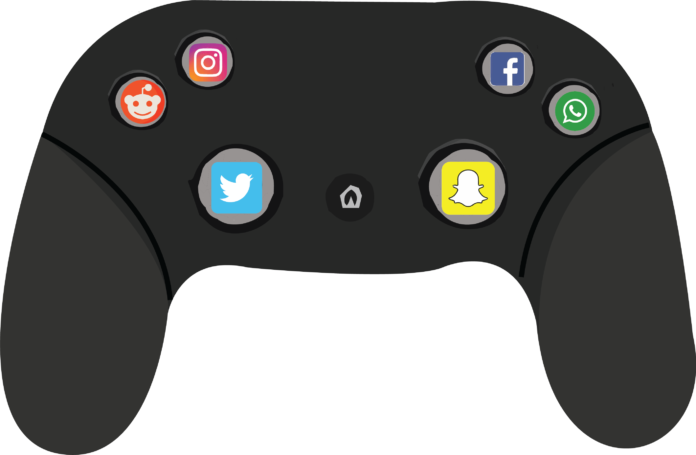Social media is a game we play against others and ourselves
The video game industry is expected to generate more than $160 billion in revenue this year. It is estimated that 65% of American adults play video games, but we all play digital games of our own each time we scroll through social media.
Gamification is known as the use of game design elements outside of traditional games, where socialization meets technology. This brand of entertainment is not only indicative of the relationship between social media and gaming, but of our society as a whole — everything from our fridges to our cars are gamified.
Social media feeds and video games are constructed similarly. Codes, algorithms and assets build the digital worlds that we interface with on a daily basis. Designers make conscious decisions about which features support social play and continued engagement, creating structures for us to interactively communicate.
Both social media and video games are traditionally believed to be anti-social spaces, but with the rise of connectivity capabilities, they are becoming entirely different ways to be social –– or so we think.
Social media even has arcade-like highscores that we give ourselves in the form of likes, retweets and follower counts. If we write a good comment, we expect to be rewarded with a plethora of likes.
Risk and reward are at the core of every interaction we have online. Whether that means deciding to post a certain picture or responding to a text or game invite right away, our time depends entirely on how and when we choose to interact. “Black Mirror” depicts this relationship in the episode “Nosedive,” in which characters rate other humans based on their interactions — a world not far off from the one we are creating today. Rating each and every interaction is what we already do in nearly every gig economy. Uber, Lyft and Airbnb all are built on this form of surveillance to hold users accountable.
In this massively multiplayer online game — this social media world that we live in — we construct characters for ourselves and interact with the other characters in our lives. No one really believes that we realistically represent ourselves online, and why should they? It’s all part of the game. We evolve and update our profiles in the same way that we gain experience points and level up our characters.
Just like all games, there are varying levels of engagement and difficulty which we can all take part. We can be passive and just watch the posts we follow, or we can be active and try to create media of ourselves.
Media incentivizes users by rewarding them for their endless hours spent on their platform. Snapchat gives you badges for certain achievements that you can collect like trophies. Instagram lets users upload highlights from their life just like you would a highlight, or replay, from a video game. It lets users livestream and share experiences the same way Twitch users can livestream games online.
Twitch is the ultimate combination of both social media and video games. With more than 15 million unique daily viewers, it is becoming a staple in most households. It uses every social aspect of games and puts it all in one spot.
Social media is a skill we have to maintain, like a muscle or body that we have to keep in shape. Influencers and content producers, like professional gamers, constantly hone their skills.
Social media has already infiltrated games. The most profitable entertainment product of all time, Grand Theft Auto V, made social media a part of gameplay through an in-game phone that lets you access apps like “Life Invader.” This Facebook-like app allows users to “stalk” their friends and satirically publicizes data mining.
Video games and social media are built on social and technical systems. Together they create a network that is highly valued in our increasingly technological society, forcing people to be social in new ways. This demand for social interaction in conjunction with our mounting isolation characterizes much of our generation’s internal conflict. Existing in front of the comfort of our screens while still wanting to be connected to the world is an inherent struggle. We’ve become hooked on the game of social interaction while remaining isolated ourselves.
Written by: Calvin Coffee – cscoffee@ucdavis.edu
Disclaimer: The views and opinions expressed by individual columnists belong to the columnists alone and do not necessarily indicate the views and opinions held by The California Aggie





